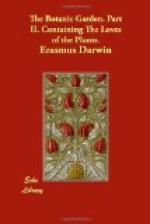Her
quivering fins and panting gills she hides
But
spreads her silver arms upon the tides;
205 Slow as she sails, her ivory neck she laves,
And
shakes her golden tresses o’er the waves.
Charm’d
round the Nymph, in circling gambols glide
Four
Nereid-forms, or shoot along the tide;
Now
all as one they rise with frolic spring,
210 And beat the wondering air on humid wing;
Now
all descending plunge beneath the main,
And
lash the foam with undulating train;
Above,
below, they wheel, retreat, advance,
In
air and ocean weave the mazy dance;
215 Bow their quick heads, and point their diamond
eyes,
And
twinkle to the sun with ever-changing dyes.
Where
Andes, crested with volcanic beams,
Sheds
a long line of light on Plata’s streams;
Opes
all his springs, unlocks his golden caves,
220 And feeds and freights the immeasurable waves;
Delighted
OCYMA at twilight hours
Calls
her light car, and leaves the sultry bowers;—
Love’s
rising ray, and Youth’s seductive dye,
Bloom’d
on her cheek, and brighten’d in her eye;
225 Chaste, pure, and white, a zone of silver graced
Her
tender breast, as white, as pure, as chaste;—–
[Ocymum salinun. l. 221. Saline Basil. Class Two Powers. The Abbe Molina, in his History of Chili, translated from the Italian by the Abbe Grewvel, mentions a species of Basil, which he calls Ocymum salinum: he says it resembles the common basil, except that the stalk is round and jointed; and that though it grows 60 miles from the sea, yet every morning it is covered with saline globules, which are hard and splendid, appearing at a distance like dew; and that each plant furnishes about half an ounce of fine salt every day, which the peasants collect, and use as common salt, but esteem it superior in flavour.
As an article of diet, salt seems to act simply as a stimulus, not containing any nourishment, and is the only fossil substance which the caprice of mankind has yet taken into their stomachs along with their food; and, like all other unnatural stimuli, is not necessary to people in health, and contributes to weaken our system; though it may be useful as a medicine. It seems to be the immediate cause of the sea-scurvy, as those patients quickly recover by the use of fresh provisions; and is probably a remote cause of scrophula (which consists in the want of irritability in the absorbent vessels), and is therefore serviceable to these patients; as wine is necessary to those whose stomachs have been weakened by its use. The universality of the use of salt with our food, and in our cookery, has rendered it difficult to prove the truth of these observations. I suspect that flesh-meat cut into thin slices, either raw or boiled, might be preserved in coarse sugar or treacle; and thus a very nourishing




